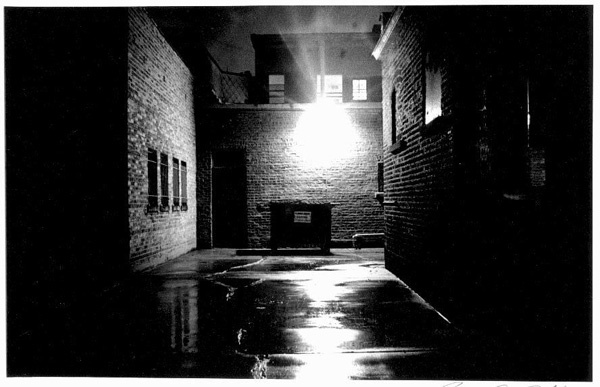On Sundays, for over three years after my separation, I walked about a quarter of mile down the street to a Christian Church, in part because I liked the preacher, the son of an Army chaplain. And I liked the church itself. It was stranger-friendly. It was a rotunda, and the sanctuary was designed like an amphitheater, holding maybe 250. The back rows, the “sun pews” underneath stained glass windows, were called Bachelors Corner, although there were no corners in that church, and none of the men assembled there were bachelors…except me, sort of.
There were usually eight or ten of them, widowers, and mostly vets from WWII, then still in their late 60s, early 70’s. As I got to know them I learned they usually came thirty minutes or so early and would swap stories under the sun glass, while Sunday school in the adjacent building was still in session. So that became my habit, as well. There was one fellow especially, Bill, who was probably the best story teller I’d ever heard. A smallish man, he retired an Army major in the 1960s. And he was from “back home”, east Kentucky. His National Guard unit was called up en masse in 1942, and trained at Camp Shelby, Mississippi, and then fought as a unit in the Aleutians. After that they split up and Bill was commissioned, and went to Italy, then onto Germany. Bill said he was promoted to corporal his first day in camp as he was one of only a few who could read.
All those fellow’s stories were of camp life or slogging through mud, sleeping in water-filled fox holes, and the like. Bill Mauldin kind of stories. Cartoons almost. Never of fighting. But as a storyteller Bill was best. He had pards named Lester, Abner, Moses and the like. His tale of Abner getting his first store-bought haircut outside Camp Shelby, and them teaching him the etiquette of how to pay for it (“always carry nickels, never give ’em a quarter and have to ask for change”…Abner wasn’t too good as his sums and takeaways either”) was as funny a story I’d heard since Ring Lardner.
My first Memorial Day Sunday at that church, I learned it had its own rites associated with that solemn day. The minister would come in, say an opening prayer, then ask the congregation to turn to page such and such and then come back to the sun pews and sit among the bachelors. The rest of the congregation stood the whole time. They went through the panoply of patriotic songs in the hymnal, “God Bless America”, “My Country Tis of Thee”, “Battle Hymn of the Republic”. For my life, even now, I can never get through the first stanza of “America the Beautiful” thinking about those men. I just can’t squeeze the words out. And the old Crusader hymn “Fairest Lord Jesus”? Oh, my.
And the bachelors would sit and quietly weep, as bespoke their sense of dignity, their heads bowed, remembering those lost comrades, those same lost comrades they’d joked about only the week before; Mose, who stepped on a mine, Abner who took a bullet through the head hunkered down right next to Bill, and others who went down at Leyte or Saipan or Anzio. In the congregation, one by one a few men would turn, veterans I expect, still with families, some my age, Vietnam, Korea, then come back and sit and weep with these old fellows. Some brought their sons and their grandsons, so they could get some sense of this sacred rite, as well, and to show them how grown men cry.
For the better part of an hour this went on, then the preacher got up, wiped his eyes, blew his nose and mounted the pulpit, said a prayer and everyone left. He didn’t even pass the plate.
Next week, 10:30 sharp, the bachelors were back in their corner, swapping stories.
I participated in this rite three times. Of course, most of those old fellow are gone, now. But I look down at my shoes and realize I’m their age myself now. I’m no longer a bachelor, but I hope in that church, and thousands more around the country, this Sunday and every Memorial Day Sunday, congregations will pause and consider all of those men sitting on the back pews, or anywhere, alone, especially, but all of us who served.
And most of all I pray mothers will still send their men and sons back to those back rows to comfort those men and to learn from them.
In these times it may be the only true commemoration we’ll get for some years to come. That which doesn’t kill us makes us stronger.




